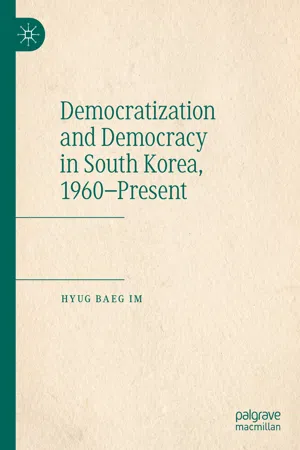
- English
- ePUB (mobile friendly)
- Available on iOS & Android
Democratization and Democracy in South Korea, 1960–Present
About this book
This book analyses democratization and democracy in South Korea since 1960. The book starts with an analysis of the distinctive characteristics of bureaucratic authoritarianism and how democratic transition had been possible after inconclusive and protracted "tug of war" between authoritarian regime and democratic opposition. It then goes on to explore what the opportunities and constraints to the new democracy are to be a consolidated democracy, how new democracy had changed the industrial relations in the post-transition period, how premodern political culture such as Confucian patrimonialism and familism had obstructed democratic consolidation, and the improvement of quality of democracy. The author compares empirically, from the perspective of a comparative political scientist, political regime superiority of democracy over authoritarianism with regard to economic development. He concludes that "democratic incompetence" theory has been proven wrong and, in South Korea, democracy has performed better than authoritarian regimes in terms of economic growth with equity, employment, distribution of income, trade balance, and inflation. This book will benefit political scientists, development economists, labor economists, religious sociologists, military sociologists, and historians focusing on East Asian history.
Frequently asked questions
- Essential is ideal for learners and professionals who enjoy exploring a wide range of subjects. Access the Essential Library with 800,000+ trusted titles and best-sellers across business, personal growth, and the humanities. Includes unlimited reading time and Standard Read Aloud voice.
- Complete: Perfect for advanced learners and researchers needing full, unrestricted access. Unlock 1.4M+ books across hundreds of subjects, including academic and specialized titles. The Complete Plan also includes advanced features like Premium Read Aloud and Research Assistant.
Please note we cannot support devices running on iOS 13 and Android 7 or earlier. Learn more about using the app.
Information
Table of contents
- Cover
- Front Matter
- 1. Introduction: My Democratization Studies in Retrospect
- Part I. Authoritarianism and Democratic Transition
- Part II. Democratic Consolidation and After
- Part III. Toward a Quality Democracy in South Korea
- Back Matter